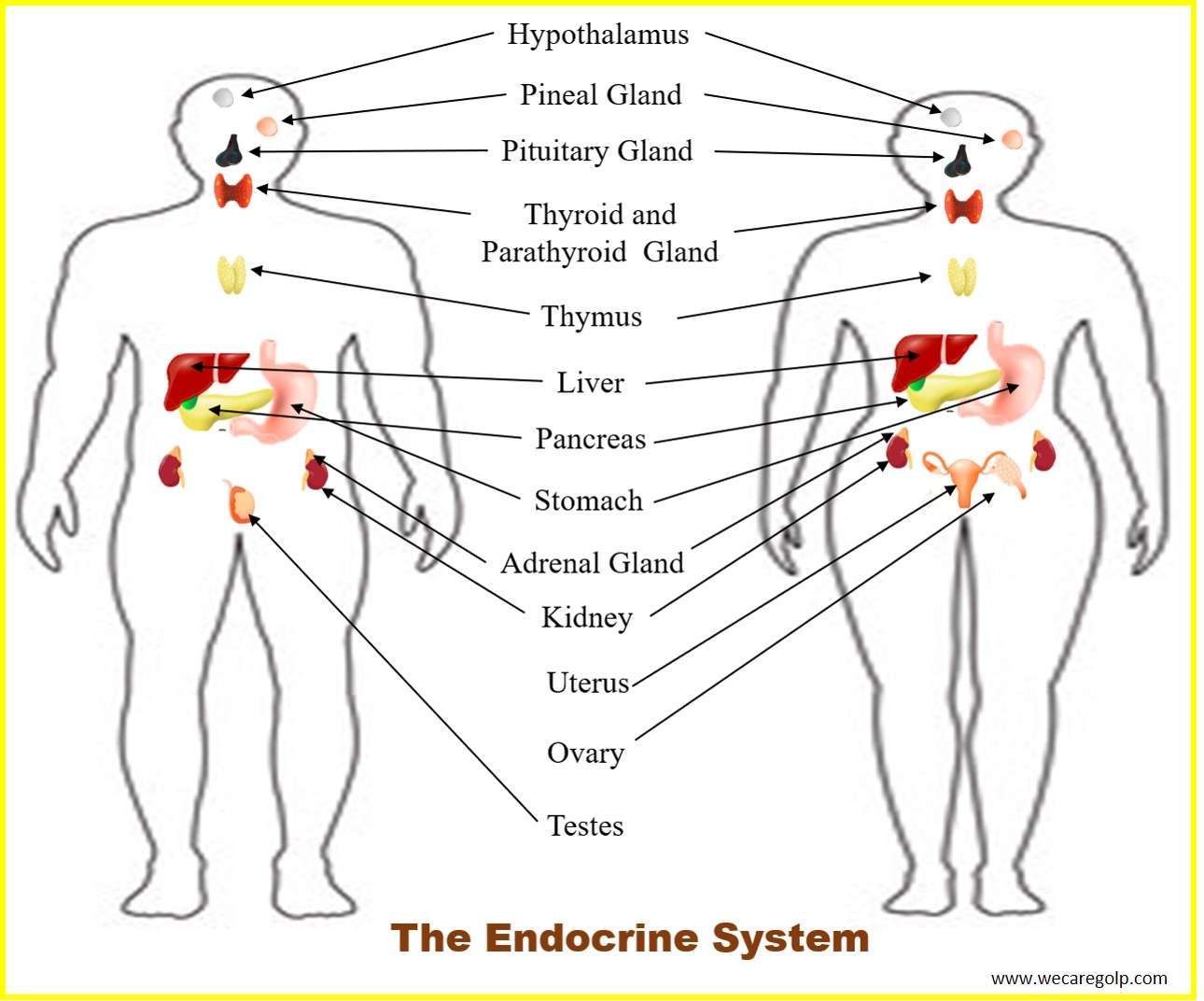Hormone
Hormones are chemical messengers in the body. They transmit information and regulate numerous body processes such as metabolism, nutrition, growth and development, breathing, blood pressure, salt and water balance, sexual functions and pregnancy etc. They are released by hormone-producing cells into the surrounding tissue (paracrine secretion) or the blood vessels (endocrine secretion).
Different glands and organs produce different hormones
Hypothalamus
- Anti-diuretic hormone (ADH): This hormone increases water absorption into the blood by the kidneys. It is also called vasopressin.
- Thyrotropin-releasing hormone (TRH): TRH triggers the release of thyroid-stimulating hormone (TSH), which stimulates the release of thyroid hormones, which regulates metabolism, energy and growth and development
- Corticotropin-releasing hormone (CRH): CRH sends a message to the anterior pituitary gland to stimulate the adrenal glands to release corticosteroids, which help regulate metabolism and immune response.
- Growth hormone-releasing hormone (GHRH): It regulates growth hormone release in the anterior pituitary gland. It aids healthy bone and muscle mass and affects fat distribution.
- Gonadotropin-releasing hormone (GnRH): GnRH stimulates the anterior pituitary gland to release luteinizing hormone (LH) and follicle-stimulating hormone (FSH), which work together to ensure normal functioning of the ovaries and testes.
- Dopamine: Dopamine is particularly known as being the happy hormone. It is responsible for our experiencing happiness. It affects many parts of your behaviour and physical functions, such as motivation, attention, mood, movement, learning, sleep etc.
Pineal gland
- Melatonin: The main job of melatonin in the body is to regulate sleep-wake cycles. Darkness causes the body to produce more melatonin, which signals the body to prepare for sleep. Light decreases the production of melatonin and signals the body to prepare for being awake.
Pituitary gland
- Growth hormone (GH): GH is essential in the early years to maintain healthy body composition and for growth in children. In adults, it aids healthy bone and muscle mass and affects fat distribution.
- Thyroid-stimulating hormone (TSH): TSH stimulates the thyroid gland to produce hormones.
- Adrenocorticotropic hormone (ACTH): ACTH stimulates the adrenal glands to produce hormones.
- Follicle-stimulating hormone (FSH): FSH works with luteinizing hormone (LH) to ensure normal functioning of the ovaries and testes.
- Luteinizing hormone (LH): LH works with FSH to ensure normal functioning of the ovaries and testes.
- Prolactin: it stimulates breast milk production.
- Oxytocin: It helps in a variety of processes, like contracting the uterus during childbirth and stimulating breast milk production after childbirth.
Thyroid gland
- Triiodothyronine (T3 ): T3 helps maintain brain function and development, the body´s metabolic functions, healthy bone, muscle control, heart functions.
- Thyroxine (T4): T4 signals to the hypothalamus to release thyrotropin-releasing hormone (TRH), which stimulates the pituitary gland to release the thyroid-stimulating hormone (TSH).
- Calcitonin: Calcitonin helps to control the calcium level in the blood.
Parathyroid glands
- Parathormone (PTH): PTH helps the formation of active vitamin D, which increases calcium and phosphorous absorption in the intestine.
Thymus
- Thymopoietin: It is a 49 amino acid polypeptide that is secreted by epithelial cells of the thymus and affects lymphocyte differentiation. It influences the proliferation and maturation of T lymphocytes
Stomach
- Gastrin: It stimulates the stomach to release gastric acid during a meal which allows the stomach to break down the foods and absorb the vitamins. It minimises the risk of infection within the gut, acts as a disinfectant and kills most of the bacteria that enter the stomach with food.
- Ghrelin: This hormone stimulates appetite and promotes fat storage. Therefore, it is also called the hunger hormone.
Pancreas
- Insulin: It is a peptide hormone that controls the amount of glucose in your bloodstream at any given moment. Insulin is the natural antagonist of the hormone glucagon. It also helps store glucose in your liver, fat, and muscles and regulates your body’s metabolism of carbohydrates, fats, and proteins.
- Glucagon: This hormone involves in controlling blood sugar levels by working in the opposite way of insulin. It stimulates the cells to release glucose and raises blood glucose levels.
- Somatostatin: Somatostatin is produced by many different tissues primarily in the nervous and digestive systems. The main function is to prevent the overproduction of hormones and stop the unnatural rapid reproduction of cells like tumours. For example, when the level of the pancreatic hormones, such as insulin and glucagon, get too high, somatostatin is secreted to maintain a balance of glucose in the blood.
Adrenal gland
- Glucocorticoids: They secrete from the adrenal gland in response to stress. These include hydrocortisone (which helps to regulate blood pressure and cardiovascular function) and corticosterone (regulates immune response and suppress inflammatory reactions).
- Adrenaline: It is also called epinephrine. It rapidly responds to stress by increasing blood sugar levels, heart rate, contractility and relaxing of smooth muscle in the airways to improve breathing.
- Noradrenaline: It is also known as norepinephrine. It has effects similar to adrenaline, such as increased heart rate, blood sugar level, contractility. However, it can cause vasoconstriction (the narrowing of blood vessels), which increases blood pressure.
Kidney
- Calcitriol (Vitamin D3): Calcitriol is an active form of vitamin D, which promotes calcium absorption and bone growth. It is also known as 1,25-dihydroxycholecalciferol. It controls the body´s calcium metabolism together with the parathyroid hormone.
- Renin: Renin is an enzyme that is produced in the juxtaglomerular apparatus of the kidneys and influences blood pressure. It is part of the so-called renin-angiotensin-aldosterone system (RAAS). Its main task is to keep the blood pressure and the volume of fluid in the circulatory system constant.
- Erythropoietin(EPO): It is a glycoprotein hormone that promotes the formation of erythrocytes (red blood cells) in the bone marrow (erythropoiesis) and initiates the synthesis of haemoglobin (the molecule within the red blood cells that transports oxygen).
Ovaries
- Estrogen: It affects the development of female sexual characteristics and reproductive development. It acts significantly for the functioning of the uterus and breasts. It also contributes to cognitive health, bone health and the function of the cardiovascular system.
- Progesterone: It stimulates the lining of the uterus for fertilization and prepares the breasts for milk production.
Testes
- Testosterone: It is the major sex hormone in men. There are many functions of testosterone in the male body such as: starting and completing the process of puberty, bone and muscle development, growth of body hair including facial hair, change of vocal cords to produce the adult male voice, sexual function, prostate gland growth and function, sperm production.
- Androgens: Androgens are responsible for male sexual and reproductive function. They help for the development of secondary sexual characteristics in men, including facial and body hair growth and voice change. Androgens also affect bone and muscle development and metabolism.
References
- Hormones | You and Your Hormones from the Society for Endocrinology
- What are Hormones? (news-medical.net)
- Hormones and the Endocrine System | Johns Hopkins Medicine
- hormone | Definition, Function, & Types | Britannica
- Glands & Hormones A-Z | Hormone Health Network
- Your Health and Hormones | Hormone Health Network
- 5 Important Hormones and How They Help You Function: The Well for Health: Health and Wellness Center

